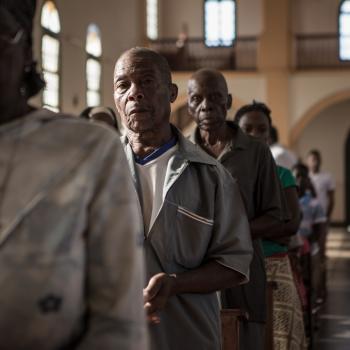 With relation to time, Walker Percy once compared the present to the tape head on a recorder. Into that receptacle, the pristine potentiality of the future is fed—a blank magnetic strip streaming across an apparatus that captures the clamor of the known world. In this way, the present is akin to the mouth of time.
With relation to time, Walker Percy once compared the present to the tape head on a recorder. Into that receptacle, the pristine potentiality of the future is fed—a blank magnetic strip streaming across an apparatus that captures the clamor of the known world. In this way, the present is akin to the mouth of time.
For Percy’s Lancelot Lamar, musing about life from his insane asylum, the past’s consumption of the future was a horrible thought. For the process is one in which the freedom of all things is chewed, mangled, and suffocated by the crush of the one thing. Potential is transformed, and thereby corrupted, by actualization.
We are always in danger of the past’s banality—its boring predictability, its deadening muck of petty, moronic badness—swallowing up all possibility and converting it into the stale mess of exhausted routine.
The past is a Charybdis, naught but its loathsome jaws and the black hole that they gape above.
So with this delightful little image, I end the old year and begin a new one, myself among the masses standing upon the tape head—or rather, within it. Time has not yet swallowed us up, but its intentions are quite clear. Its plan is evident.
And like Lancelot, looking around, it seems there must have been a mistake made somewhere along the way; the world has gone terribly wrong, and I begin to kick through the ashes of the past for a clue as to whether anything can be done about it.
For here we are, some twelve years into the millennium, well into the second decade of the historical process. The speed with which the chronicle devours us fairly dizzies the constitution. To confuse matters more, there are two vastly different stances about the state of things to come.
A portion of the populace, I would say the minority, whets a finger, tests the air, and perceives a coming storm. They sniff the breeze and smell fire, squinting as daylight turns to shadow. The culture as it is known—has been known in recorded civilization—is dying. Tenebrae is on the move.
But the rest of the populace, I would say the large majority, does not see, smell, and sense these things, or else they do, but do not seem to mind very much. They may be glad of this culture’s death, in fact. Some graves are to be danced upon, and a brave new world, rallied and protested for, is to be met with cymbals, flutes, and choirs.
One sees the future and is sure it is free of the past; the other sees the future and knows it as a repeat of the past. One looks at the birth of events as metamorphosis, to be followed by utopia, the heaven on earth long-looked for; the other sees the beast, long-dreaded, always reappearing, in each and every age, rising yet again from the desiccated lap of a primeval sin, midwifed by the prologue of a tragedy older than cliché. The beast, fate, crawls through the musty, cobwebbed womb, is licked and swaddled by a leathery old crone, then held aloft as if it were pure.
These two congregations walk side by side throughout the world—one convinced of dawn, the other of twilight. I am among those who think that there is nothing new under the eclipsing sun.
“So what is the way out?” might be asked.
For the Gomorrah of our past has already been slouched toward, arrived at, wallowed in. And yet, like the repetition of an old joke, terrible in its stale echo, we find ourselves—again and again and again—on our way there. The tape head is a treadmill, grinding ruts into a deepening grave. Time holds itself hostage, a man betrayed by a paralyzed body, gagged by his own tongue.
Again: what is the way out?
Oh, Lancelot cried, we need to be redeemed of this time. We need to be clean of it, scrubbed of it—from marrow to mane. We need a new air, new sea, new space. We need Yeats’s Byzantium—shimmering down to its very cells—and us, finally, at long last, a people fit to fill it: a courtly, bold race, worthy of our names.
That’s what we need.
And not just us, either—and not just our world—but the clock within which we live, as well. Time itself must be freed—existence loosed from its burden, from the chains of doomed fate and hopeless legacy.
That’s what we need.
Which is funny; for only a few days ago, at altars, over candles, they spoke of that very thing, just as they have for two thousand years or more.
And they said that no matter the dark, no matter even the day, there is something that exists outside either. They said that the wrongs have been righted; a trick has been played, and by its means, the sold are bought back again.
The account that has trapped us is cancelled—all scores undone; destiny’s tapestry unskeined. They said that there is no past anymore, if you can believe it.
I have believed it.
But now—now, how hard it is to hold to that news; only a few short days past, and already there is the pressure of wind, and the scent of flames. What I have believed totters, trembles.
Faith slips free of a quaking resolve—one bound by old mistakes and old faults, as terrible as they are true. How hard it is to abide when the present is so loud. It shrieks with the din of chaos.
Still, it must be done. Damned as we seem, we must believe it: That we move upon a new plane now, one in which there is no forward or reverse, no rewind or pause—or so says the news.
The record is blasted, blanked, the tape, broken. All is hope. All is sky.
That’s what they say anyhow: Trust. Abide. Sursum corda, lift up your hearts.











